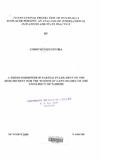| dc.description.abstract | The end of the Cold War and the surge in civil wars during the last two decades have led
to the emergence of internal displacement as one of the most challenging issue faced by
the international community in the area of human rights and humanitarian assistance. In
contrast to refugees who are provided with special protection under international law by
the 1951 UN Convention, as well as a dedicated international organization in charge of
protecting their specific rights, internal displaced persons have remained largely ignored
by national governments and the international community.
In recognition of the emerging international responsibility to protect and assist persons
uprooted and at risk within the boundaries of their own countries, roughly twice the
number of refugees, the United Nations Guiding Principles on Internal Displacement
were developed in 1998. Meant as a useful point of reference in drafting national
legislation for the protection and assistance of internal displaced persons, the Guiding
Principles reflect and are consistent with international human rights law and humanitarian
law, but are not binding upon states.
This thesis examines the effectiveness of international legal and institutional framework
for the protection of internally displaced persons and assesses state implementation of
national policies based on the UN Guiding Principles, using Uganda as a case study.
The concept of sovereignty in the context of internal displacement is reviewed in light of
recent developments and debates on this critical issue. In particular, the study takes the
position that in as much as internal displacement is a consequence of the abuse or
violation of human rights, the same is the legitimate concern of the international
community and sovereignty cannot be used as a defence against international action to
protect the internal displaced persons.
This study argues that incorporating the Guiding Principles in domestic legislative or
legal framework does not guarantee effective compliance with the Principles. The real
v
test comes in how these policies that are sound on paper are applied in practice and how
far governments succeed in protecting the rights of internal displaced persons. The need
for effective monitoring and accountability mechanisms at local, national, regional and
international levels is therefore required to ensure effective implementation of the
Guiding Principles in emergency settings. | en |

